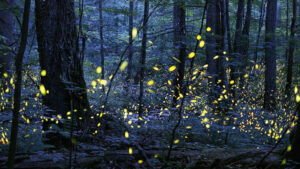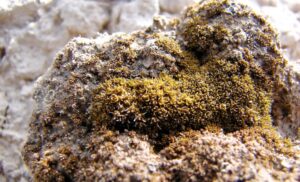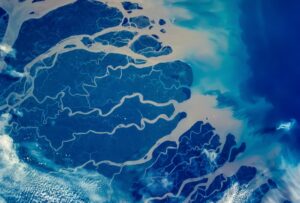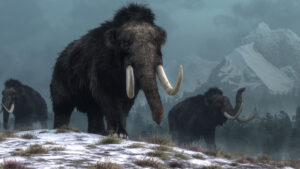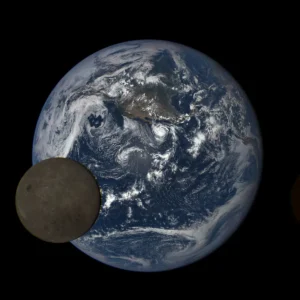Guillaume Moreau, Nicolas Roulx, and Jacob Racine have completed the first section of their epic 7,600km journey from Canada’s far north to Point Pelee National Park in southern Ontario, near the Canada–U.S. border.
Each lugging a 135kg sled of supplies and gear, they set out from the Eureka weather station on Ellesmere Island in mid-March. They had budgeted 40 days of food and fuel to get to their first resupply point, the small Inuit town of Resolute, and they stubbornly stuck to schedule: They took exactly 40 days for the 800km journey.

The route so far. Red line = projected route, black teardrops, actual route. Photo: Expedition AKOR
Speaking by satellite phone from Resolute, Moreau sounded surprisingly chipper for someone who had just endured over a month of subzero temperatures, a knee injury, and a painful polar rash: “It has been a very special, unique experience…I’m proud that we did it as a team.”
A difficult start
The threesome had an uneven start. As they set off across the Eureka Sound, temperatures dropped as low as -35°C and strong winds blew from the south. These headwinds, plus the fully laden sleds, made for grueling work.
But Moreau says that the humidity was the most shocking. Perhaps from sweating or overdressing, their gear became blocks of ice during the day. At night, their sleeping bags and clothes would thaw, so they would wake to wet clothes and painfully cold bodies.

Photo: Expedition AKOR
Moreau suggests that this moisture caused his polar rash. To make matters worse, Moreau’s knee was swollen and so painful that he couldn’t lift it to walk, forcing him to stay on skis. On hard High Arctic snow, it is faster for most people to walk rather than ski.
These assorted difficulties (plus two weeks of required COVID isolation in Ottawa before the expedition) made it hard to cover enough ground per day. To give Moreau’s knee a chance to recover, Racine and Roulx took some extra weight. Slowly, they increased their daily travel times. Still, not until 20 days into the journey did they finally start to complete their required 20km shifts.

A High Arctic campsite. Part of their polar bear alarm fence is visible in the picture. Photo: Expedition AKOR
After reaching Norwegian Bay, conditions improved and they made up lost time. All three picked their two-day crossing of Devon Island as the highlight of their journey. After 10 days of ice and wind, Devon — the world’s largest uninhabited island — marked a return to land. Finally, they had something to look at: Black ice lakes, peaks, and great skiing helped them fly across the island.
In upper Wellington Channel, between Devon and Cornwallis Islands, they encountered lots of polar bears — 10 of them during their three-day crossing of the channel. Some bears were very curious and came as close as six metres. However, flashbangers, yelling, and one full night when they took turns on polar bear watch was enough to deter the curious ones from approaching too closely.
Soon after, they altered their route slightly and crossed flat Cornwallis Island to avoid rough, broken ice of Wellington Channel. They continued to keep on schedule, churning out 20km days and arriving in Resolute after 40 days, just as their supplies ran out.
A major route change
They will stay in Resolute for about two weeks, taking antibiotics for their injuries, and planning the next section of their expedition to Gjoa Haven. They have decided to make a major route change: They will hire a plane in Resolute and fly over Barrow Strait, the channel between Cornwallis Island and Somerset Island. This 80km stretch, part of the Northwest Passage, would have been the most difficult section of the expedition.
The ice in Barrow Strait varies from year to year. This year, it broke up early. They decided not to risk crossing over moving ice and swift currents. They have also ruled out a 300km westward detour to avoid this open water, citing the extra food required and the logistics they have already laid down for Gjoa Haven.

Left to right: Nicolas Roulx, Jacob Racine, and Guillaume Moreau. Photo: Expedition AKOR
It’s a short flight, and the 80km seems insignificant when compared to their 7,600km journey, but it’s a major gap nonetheless. It breaks their otherwise continuous line and avoids what was always going to be the crux of their entire route. It threatens to add an asterisk to their epic endeavor. Theirs is likely the longest all-wilderness expedition ever done in Canada.
I asked Moreau if they had enjoyed or endured the journey so far: “I’ve endured. We [Moreau and Roulx] are canoeists. For the last five years, we have trained for this, built up experience, talked to experts. But this was our first time in the High Arctic. Jacob [Racine] definitely enjoys, not endures. This is his environment, and his experience helped a lot.”
They leave on their second segment in a couple of days. Next stop: the village of Gjoa Haven, about 600km and 35 days away.


